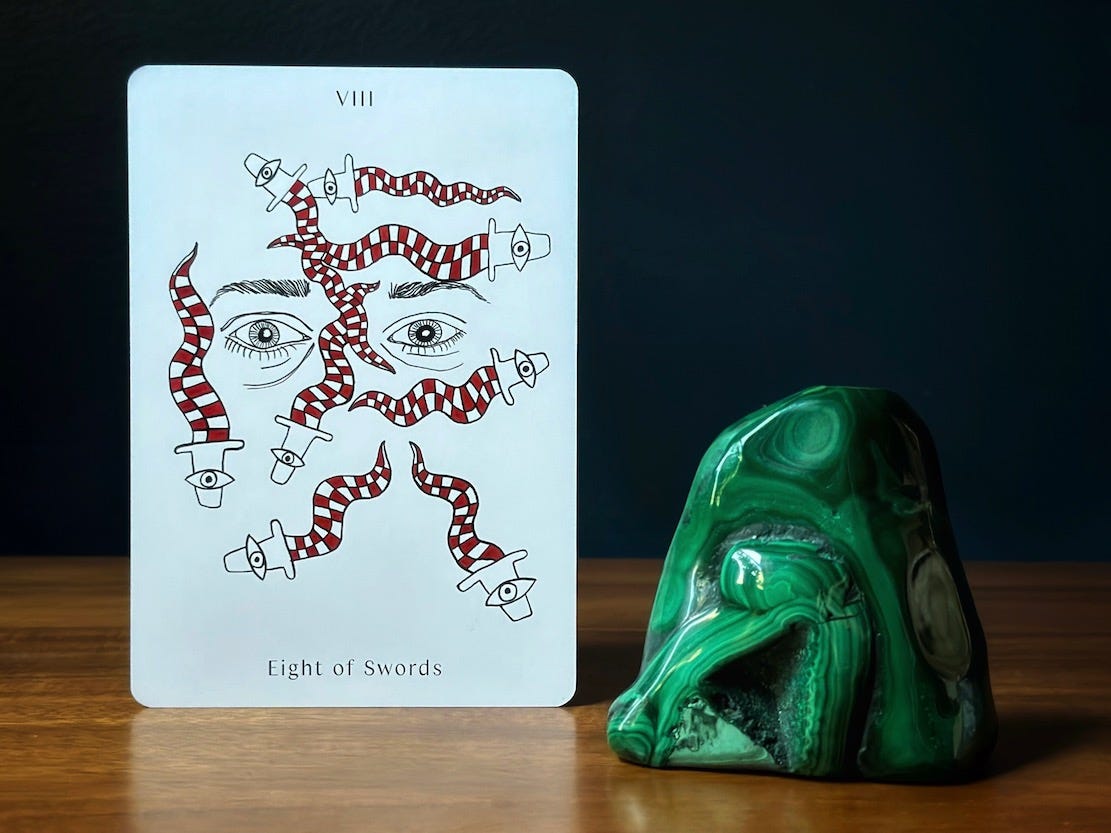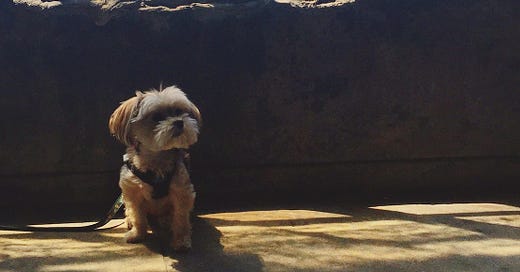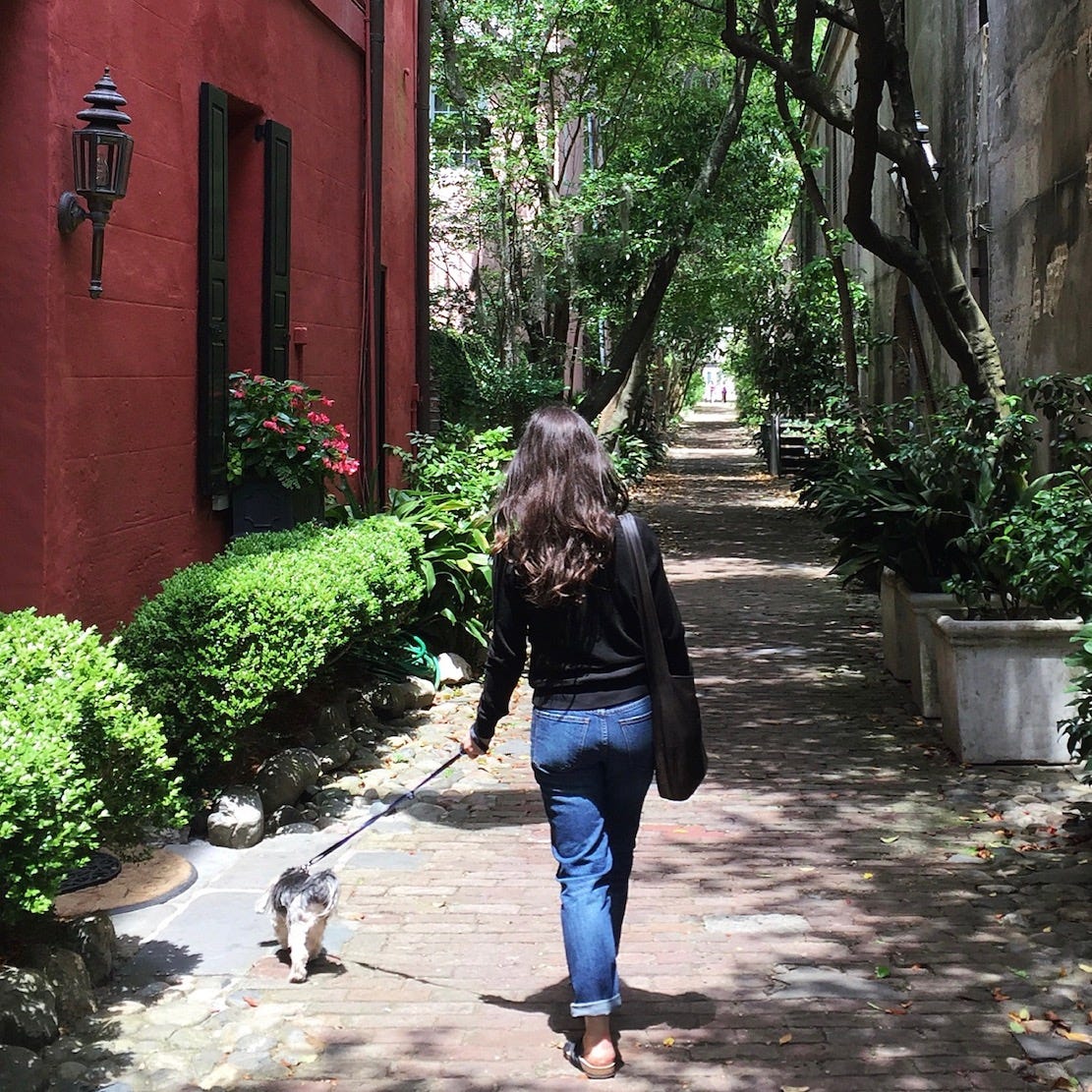When I told my partner I planned to write about dog grief, he screwed up his face like he’d just smelled a fart.
“I don’t know if I’m going to be able to read that,” he said.
I get it. Who would want to spend their precious leisure time ingesting pet-related sadness, let alone about an animal they may never have met?
So, before we begin, let’s make one thing clear: This is not that kind of essay.
I hate sad things about dogs. If I’m watching a movie and get the slightest inkling that something bad will befall an animal, I turn it off or leave the room. I am destroyed by sad tributes or the heartfelt descriptions that accompany adoptable pets. (This doesn’t stop me from weeping my way through them.) If I’m going to go there, I want it to be useful. Positive, even. As much as the topic allows.
I am writing this with a very specific person in mind—someone I was until quite recently, and may one day be again. A person who loves an animal maybe a little too much and wonders how they will go on without them. A person who worries, despite the prevalence of pet apparel and pet strollers and human-grade pet food, that there is no one who will understand the magnitude of that love, or the hole it will eventually occupy.
Many salient things have been written on loving and losing a pet—illustrated books and essays and newsletters. But for a long time, I craved something different—for someone to tell me that my own outsized feelings were valid. And that when it was my turn to step into that most dreaded place, I would be okay.
Barring that, I became the world’s foremost researcher on the topic. I indulged my fascination with others who’d been down that road, poring through posts, searching for evidence that life went on, that they put one foot in front of another. How long did they wait before adopting another pet? How long until they seemed—in that vague social media sense one can never quite trust—happy?
As anyone will tell you, grief is wildly individual, and I can only speak to my own experience, my feelings, my pain. But I can tell you, with unwavering certainty, that your feelings are valid. I don’t need to know you to know this is true.
Some of us don’t have supportive families, or partners, or kids, and an animal becomes our primary attachment figure. Our animals see us through difficult transitions and various life stages, witnessing us in our most vulnerable moments. I often muse on how it can be possible to feel so connected to someone with whom I’ve never had a two-sided conversation (in spoken words, at least). But that’s precisely it. The love of an animal is so simple, so total, so pure. It is all presence, no pretense. Nothing comes close.
A friend confided that in his experience, losing his dog was harder than losing his parents. Another shared this anecdote: At one particularly low point, caught between jagged sobs, she called a mental health hotline. She told the counselor she had lost her partner, “partly so I would be taken seriously, but also because that felt like the most accurate description of what [my dog] was.”
Many feel that pet loss is not given the reverence it deserves. But in my (lengthy) stretch of anticipatory grief, I discovered I was not alone. I stumbled across this pet loss course created by psychotherapist Alan Robarge, inspired by the lack of resources available to him when grappling with the loss of his own dog. I also found a number of pet grief support groups, virtual and IRL, connected to animal hospitals, mental health agencies, and various spiritual communities.
Before Mia passed, people would share any number of things (under the banner of helpfulness) that I found devastating or frightening or infuriating.
“I wish I could tell you it gets better, but grief never goes away,” said everybody, a wistful look in their eyes. “You just learn to live with it.”
Never? This was terrifying. Why hadn’t someone warned me sooner? If I had known the trade off for 10-15 wonderful years was to feel awful forever I might’ve thought twice before signing up.
I have since heard that while the love doesn’t go away, and the feeling of missing someone doesn’t go away, that acute sense of pain does, in fact, subside. This seems an important distinction.
“Grief is unpredictable,” cautioned a friend. “Even if you feel fine at first, you may find it gets worse in weeks or months.” Cool, I thought, thanks for the heads up.
The mere mention of a rainbow bridge made me want to lob a fistful of Skittles in whatever direction it came from.
“You can still talk to her after she’s gone,” someone offered, hopefully. I thought of my very alive dog, still capable of answering with a head tilt and a bark, and thought, no I cannot. Not like this.
Indeed, the most helpful words came not from an acquaintance but from Robert Frost:
“In three words I can sum up everything I’ve learned about life. It goes on.”
And so it does.
Mia’s presence was a gift. She had my very favorite face. She made me laugh dozens of times a day. She made mundanity sparkle and the unbearable somehow okay. (I know, I know, I said no tribute.) Now that she is gone, I am left with the many other gifts she bestowed upon my life—the power of an indomitable spirit, seizing the moment, and being so purely and beautifully oneself.
But perhaps the greatest one is this: I now know it is possible to love someone so much that against all logic they continue to bring you joy, even in grief.
I used to look at posts about pet loss and think that I wouldn’t wish that on anyone. But on the other side, my feelings on the matter have changed. I wish everyone could know this feeling. May we all experience a love like that.
Card of the Week
Here is this week’s card for the collective, as well as some thoughts to carry into the days ahead. As most modern readers will tell you, tarot is not about fortunetelling, nor is it about neat, definitive answers. The cards are simply one path to reflection, a way of better knowing ourselves and others through universal themes. If this reading resonates with you, great! And if not, no worries. Take whatever may be helpful and leave the rest.

Here’s a question: How would you cast yourself in the movie version of your life? I don’t mean which actor you’d want to play you (although that’s always a fun game), but what kind of character you’d be.
Are they a hero? A victim? (Or, more likely, a flawed human combination of both?) Do they have a clearly defined want? Do they have main character energy? Will they have an epiphany that causes them to change their approach to life?
This is just one of the many lines of questioning posed by the Eight of Swords.
This card often depicts a person standing amidst a crude fence of swords, blindfolded, arms at their sides. But their feet are noticeably free. They are able to walk away from this situation, though they may not know or believe it.
For some, the Eight of Swords is about those times we wander into a room, shut the door behind us, and complain that we feel stuck. We may be fortunate enough to have options, but none of them appeal.
The fact that we can open the door is lost on us.
Swords are the suit of mind, thought, and intellect—our old friend rationality—which feels particularly relevant here. The character on this card isn’t trapped by literal swords, but bound by their own thoughts and fears.
We’ve all been there.
Worries, anxieties, assumptions, expectations—these can get the better of us. They can make us feel small or frightened. They can convince us not to try. They can cause us to isolate, to mistrust, to struggle. (Sometimes rightfully, sometimes needlessly.) They can find us, time and again, getting in our own way.
But what if they’re wrong?
What if the support, connection, or inspiration we seek is right outside our door? This card demands we consider another way.
The Eight of Swords would like us to spend some quality time getting to know our own thought process. It asks us to observe our reactions, recognize patterns, listen to the way we speak to ourselves. Are we assigning or absorbing blame?
This card is also about the ways in which we may remain willfully ignorant, or in which we may choose to remain comfortable, even when we know that taking a risk is the only way forward.
This card says there is a way, though it may not be clear. We may not see it, nor grasp how it feels or what it entails. But if we are willing to trust in the process—if we are willing to put one foot in front of the other, one step at a time—we can create the change or progress that we seek.
The Eight asks: What (do we think) is holding us back?
Is there a possibility we cannot see? Is there a path or truth we are ignoring?
This is your life. This is your process. There are no right or wrong answers.
Do you want to remain with what is known, or do you want to take a step forward, into what is waiting just outside of view? It’s up to you.












Losing our furry family members is awful and we mourn them for a long time, yes, but I take solace in giving another animal a chance at a loving home. I’ve had many dogs over the years (and now, a cat ) and a part of me isn’t complete without one (or two, lol) in my life. I think it honours their memory to provide much-needed homes for pets if we are privileged enough to be able to do so.
As someone who loved my mother dearly and lost her suddenly, I can finally confirm, losing a beloved pet is the SAME. Losing someone/something you love deeply is paradigm shifting, the world is never the same. But it’s also very comforting to know, truly know deep in your bones, that you loved them with your whole heart.
10 years later, I still love
My mom and my beloved dog Simon with similar love. One was with me for 30 years and gave so much of herself. The other was only with me for his last year and yet he gave me every last ounce of his love.